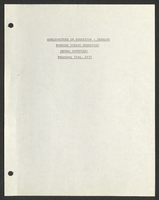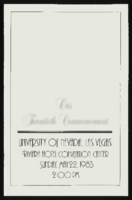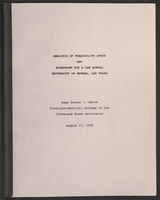Search the Special Collections and Archives Portal
Search Results

Epilogue: Nevada Southern University Yearbook, 1967
Date
Description
Yearbook main highlights: schools and departments; detailed lists with names and headshots of faculty, administration and students; variety of photos from activities, festivals, campus life, and buildings; campus organizations such as sororities, fraternities and councils; beauty contest winners; college sports and featured athletes; and printed advertisements of local businesses; Institution name: Nevada Southern University, Las Vegas, NV
Mixed Content

Robin Greenspun oral history interview: transcript
Date
Archival Collection
Description
Oral history interview with Robin Greenspun conducted by Barbara Tabach on February 09, 2017 for the Southern Nevada Jewish Heritage Project. In this interview, Greenspun discusses her family background and growing up in Las Vegas, Nevada. She talks about her early interest in the arts, working in television productions, and becoming a film director.
Text

Law School Hearings and Subcommittee on Education Hearings: minutes
Date
Archival Collection
Description
Folder from the John Vergiels Political Papers (MS-00283).
Text

Mariteresa Rivera-Rogers oral history interview: transcript
Date
Archival Collection
Description
Oral history interview with Mariteresa Rivera-Rogers conducted by Maribel Estrada Calderón on October 24, 2018 for the Latinx Voices of Southern Nevada Oral History Project. In this interview, Mariteresa discusses her early life in Concepción, Chile. She talks about her experience moving to Las Vegas, Nevada in 1965, the immigration process at the time, and becoming a Spanish language court interpreter. Rivera-Rogers recalls enrolling at the University of Nevada, Las Vegas' (UNLV) Sam Boyd School of Law, and her involvement with the Latino Bar Association. Lastly, Rivera-Rodgers discusses the challenges in translating Spanish language to English.
Text

Astrid Silva oral history interview: transcript
Date
Archival Collection
Description
Oral history interview with Astrid Silva conducted by Monserrath Hernández and Barbara Tabach on April 22, 2019 for the Latinx Voices of Southern Nevada Oral History Project. Astrid Silva was born in Gomez Palacio, Durango in 1988. She immigrated with her mother to the United States in 1992, where they were met by her father before flying to Los Angeles. She recounts her first impression of the United States and her families eventual move to Las Vegas, where she describes her time living in Las Vegas' west side and struggles she faced being an undocumented student living in Las Vegas. She describes her first meeting with Senator Harry Reid and the friendship that developed afterwards. She has spoken at the Democratic National Convention and has been vocal about her status as a Dreamer. She is currently the Executive Director for DREAM Big Nevada which was established in 2017 in order to provide aid to Nevada's immigrant families. She writes about her hopes for Dreamers and her continued work in expanding the ways that immigrant families can be helped in an always changing political climate. Subjects discussed include: DACA, Dreamers, Immigrant Rights, and Higher Education.
Text

University of Nevada, Las Vegas (UNLV) 20th commencement program
Date
Archival Collection
Description
Commencement program from University of Nevada, Las Vegas Commencement Programs and Graduation Lists (UA-00115).
Text

Dana Su Lee oral history interview: transcript
Date
Archival Collection
Description
Oral history interview with Dana Su Lee conducted by Stefani Evans, Vanessa Concepcion, and Cecilia Winchell on February 10, 2021 for Reflections: The Las Vegas Asian American and Pacific Islander Oral History Project. Dana talks about her childhood growing up in California and her parents who were both born in China. She discusses her educational background and her move to Las Vegas with her husband in 1997. Dana also shares her various community and philanthropic pursuits related to education and the arts. Subjects discussed include: Greg Lee; otherness; Nevada Women's Philanthropy (NWP)
Text

University of Nevada, Las Vegas law school feasibility studies
Date
Archival Collection
Description
Folder contains a study titled "Analysis of Feasibility Study and Blueprint for a Law School, University of Nevada, Las Vegas" by Steven R. Smith, Cleveland-Marshall College of Law, Cleveland State University, August 17,1990 and a second study titled "A Feasibility Study for a Law School at the University of Nevada, Las Vegas" prepared by R. Keith Schwer, PhD, Director, The Center for Business and Economic Research, University of Nevada, Las Vegas, May 29, 1996. From the University of Nevada, Las Vegas William S. Boyd School of Law Records (UA-00048).
Text

Mayra Salinas-Menjivar oral history interview: transcript
Date
Archival Collection
Description
Oral history interview with Mayra Salinas-Menjivar conducted by Nathalie Martinez, Elsa Lopez, and Barbara Tabach on September 20, 2019 for the Latinx Voices of Southern Nevada Oral History Project. Mayra Salinas-Menjivar is a lawyer in Southern Nevada and a graduate of William S. Boyd School of Law. She grew up in Las Vegas but describes her early years living with her maternal grandparents in El Salvador. She describes some of the aftermath she experienced regarding the Civil War in El Salvador, and recounts some testimony told to her by her mother about that particular time period. She details the differences in immigrating in the 1990s and speaks about being an undocumented student. While pursuing a business degree at UNLV she found herself working at a law firm which is where she first decided to pursue law as a career after graduation. She talks about her experiences during law school and her time helping with the law school's immigration clinic. Subjects discussed include: Salvadorian Civil War, Immigration Law, Education, DACA, William S. Boyd Law School.
Text

Dr. Javier A. Rodríguez oral history interview: transcript
Date
Archival Collection
Description
Oral history interview with Dr. Javier A. Rodríguez conducted by Elsa Lopez and Barbara Tabach on December 19, 2019 for the Latinx Voices of Southern Nevada Oral History Project. Dr. Javier Rodríguez, Biology Professor at the University of Nevada Las Vegas, talks of his personal and educational history that led him to UNLV. He discusses his migration from Puerto Rico to California where he received his PhD from the University of California Berkley and became a biological museum curator for various animal specimens. He later moved to Las Vegas to teach at UNLV where he has now been for nearly two decades; Dr. Rodríguez shares how UNLV has changed since he first started working here, including the university's increased interest in faculty research to become a Top Tier institution. Subjects discussed include: Puerto Rico; University of California Berkley; University funding; Tier 1 research institutions.
Text
